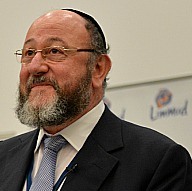click to dowload our latest edition
CLICK HERE TO SUBSCRIBE TO OUR NEWSLETTER


Published
4 years agoon
By
adminTALI FEINBERG
Mirvis, who was born and raised in South Africa, wrote among other things that “the overwhelming majority of British Jews are gripped by anxiety”, and that “this anxiety is justified”. He said, “A new poison – sanctioned from the very top – has taken root” in the Labour Party.
“It’s not my place to tell any person how they should vote,” he said. “I regret being in this situation at all. I simply pose the following question: what will the result of this election say about the moral compass of our country? When 12 December arrives, I ask every person to vote with their conscience. Be in no doubt – the very soul of our nation is at stake.”
“I’ve never heard of a religious leader intervening in an election like this anywhere in the world,” said local political analyst Daniel Silke.
“While our Chief Rabbi [Dr Warren Goldstein] spoke out against state capture, President Jacob Zuma and corruption, he never intervened in an election, told Jews how to vote, or implied that the official opposition was dangerous.
“It’s definitely an unprecedented move for a chief rabbi to intervene two weeks before an election, and to insinuate that the major opposition can’t be trusted. His comments on anti-Semitism have broader ramifications about ethics and leadership in government. His comments carry additional weight because they are so soon before Britain goes to the polls,” said Silke.
Essentially, Mirvis was involving himself in what one journalist called the “anti-Semitism arms race” taking hold of British politics ahead of the country’s national elections. “The treatment of anti-Semitism in British politics, a dangerous prejudice that demands our serious attention and analysis … has become the subject of an escalating partisan conflict. This familiar cycle – of allegations, defences, evasions, counter-claims and dismissals – has now reached a new level,” wrote journalist Rachel Shabi in The Guardian.
David Horowitz of The Times of Israel called Mirvis’ intervention a “bombshell”.
“So blatant an effort by a chief rabbi, invoking moral authority, to steer an electorate in a democracy away from a mainstream party, and at the height of an election campaign at that, [his comments] would be resonant and dramatic in any country. In a Britain renowned for mainstream tolerance, and in a Britain where for decades it has been second nature for the Jewish community [perhaps 300 000-strong, less than 0.5% of Britain’s 66 million population] to keep a low profile, to resort to a gevalt op-ed was nothing short of a bombshell.”
To direct voters is controversial, but the chief rabbi has been helped by support from other religious leaders including Archbishop of Canterbury Justin Welby, who said that the chief rabbi felt he had “no choice” but to intervene.
Archbishop Welby said on BBC4 radio, “You’d have to ask him directly, but I obviously know him quite well, and when you look at his article, he talks about it being one of the most painful decisions he’s ever had to take, and I know that’s true. “His instincts, like mine and others, are that during an election, you keep schtum, you say nothing. A lot of people in the Jewish community were saying, ‘You’ve got to speak,’ and he felt there was no choice.”
Horowitz wrote in The Times of Israel that the chief rabbi must have been stuck between a rock and a hard place. “If he spoke out, and warned of the dangers of a Prime Minister Corbyn … Mirvis would be castigated as a Conservative and Zionist stooge, accused of betraying the political impartiality of his office, and left with no access to the corridors of power were Corbyn indeed successful on election day.
“But if he was silent, and failed to sound the alarm, and the Jewish community – part of which has already begun to talk of emigration – found itself facing still greater hostility in a Corbyn-led Britain, would he rue his passivity, would he have ducked his moral and religious duty, and would he be judged by history to have failed?
“Evidently, Mirvis concluded that there was more to gain by publishing his article. If Labour wins, Anglo-Jewry may indeed find the doors of Downing Street closed in its face. But then again, its key leaders – of whom Mirvis is the last, not the first, to speak out – would not have wanted to enter in any case. If Labour loses, the Jewish community may find itself widely blamed by Corbyn loyalists, and face more of the hostility it already endures. A price worth paying, Mirvis would presumably have sighed, as he pressed ‘send’.”
Silke pointed out that anti-Semitism might dominate the discussion, but for most British voters, Brexit, social services, and the economy are their top concerns.
Yet for the Jewish community in Britain, anti-Semitism in the Labour Party is their main concern, he said. This was made all the more urgent when last Friday, a London rabbi was beaten up by youths hurling anti-Semitic slurs, and the Labour Party was criticised for producing a video (released last Saturday) about minority groups being valued by the party but left out any mention of the Jewish community.
On Tuesday, Corbyn was repeatedly urged by ITV This Morning show host Phillip Schofield to “just say sorry” about the failure to tackle anti-Jewish hatred. He eventually said, “Obviously I’m very sorry for everything that has happened but I want to make this clear. I am dealing with it, I have dealt with it.”
But for some, this may be too little too late. “There could be an existential crisis for the Jewish community in the United Kingdom if Corbyn comes to power.” said Silke.
“This election is potentially a watershed.”
